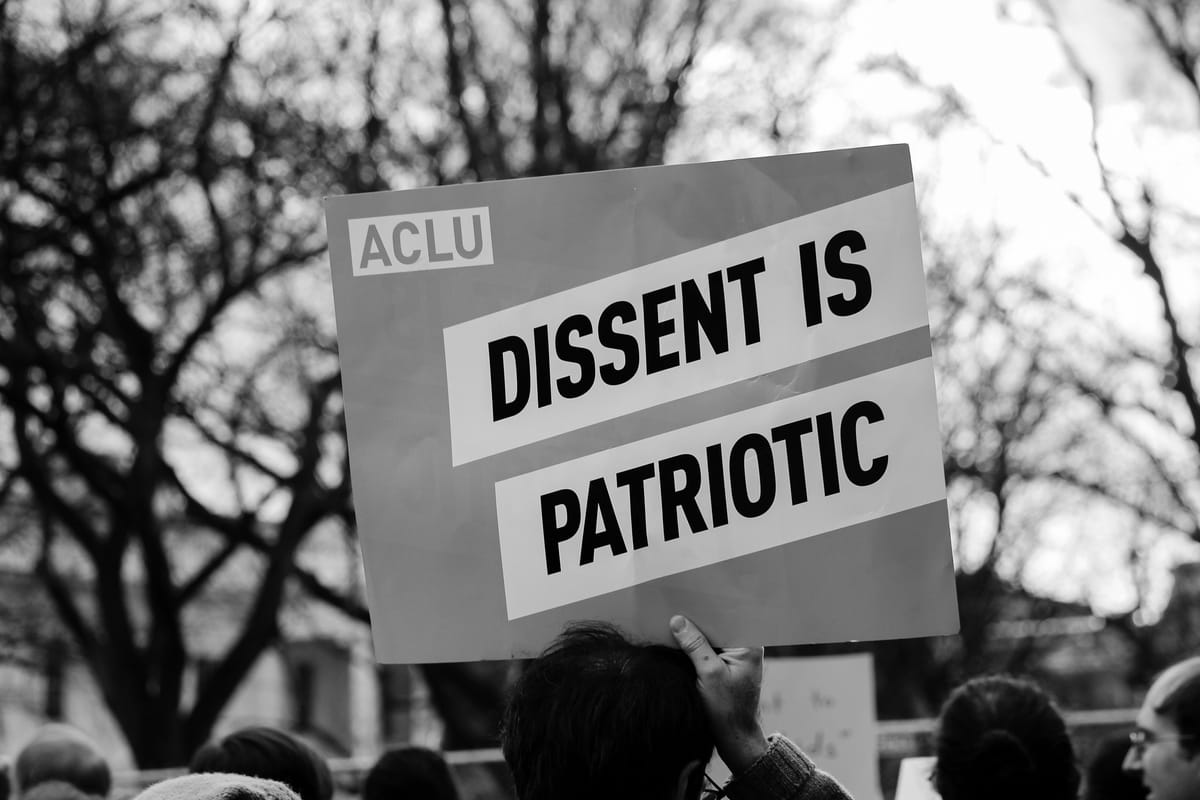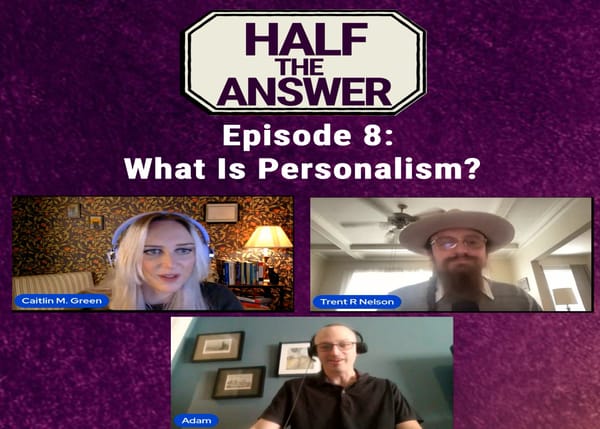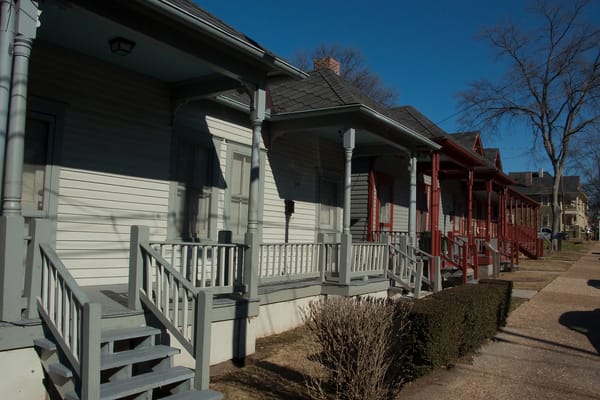The Case Against Despair
In politics sometimes you’re in government, sometimes you’re in the opposition, and sometimes you’re a dissident.

The last two weeks have been among the scariest for liberals and for the broader anti-Trump, pro-democracy coalition since Donald Trump descended the golden escalator and accused Mexicans of being rapists and drug dealers in announcing his candidacy in 2015. President Biden's disastrous debate performance on June 27th was what kicked off the collective alarm and widespread calls for him to withdraw from the race in favor of someone younger. The Republican majority's decision in Trump v. United States, which gives presidents near total legal immunity for official acts during their presidency and which defines official acts so broadly as to make it functionally impossible to ever hold a president legally accountable for lawless or corrupt behavior in office, only added to the pro-democracy coalition's freakout.
The net effect of these two events has been to stoke panic among the friends of freedom both in America and abroad with many succumbing to nihilistic doomerism and despair. While this is a very understandable impulse—I myself had probably my worst mental health day since 2016 this week—despair is neither the right response, nor one we have any right to indulge.
There is, as the writer John Green has observed, a certain seduction to despair. This is because despair can always seem like a viable choice—'the good old days' are famously a myth and at no point in history have humans ever faced a shortage of problems. And despair can also seem like a viable choice because of the certainty that none of us are going to make it out of this thing alive. Moreover, our entire solar system will eventually be swallowed by Andromeda. In that case, why bother to struggle for or against anything at all? Why not embrace nihilism?
I offer two reasons. First, because despair is a lie. It says that we know for certain that nothing will ever get better. Not only is that not something anyone can know, all the evidence of modern human history strongly contradicts it. Humanity's last 500 years is the history of an accelerating and dramatic improvement in the wellbeing of almost everyone alive compared to our ancestors. The second reason to refuse the poison chalice of nihilism is that doing so dramatically improves one's subjective experience of life. Maybe someone else somewhere has met a happy, fulfilled nihilist, but I certainly have never heard of such a person. On the other hand, there is a large body of very well-documented evidence that a sense of purpose is one of the core requirements for mental health and human flourishing.
Returning to a more temporal plane and the situation American liberals and democrats are now faced with, there are more practical reasons to take heart. In politics sometimes you’re in government, sometimes you’re in the opposition, and sometimes you’re a dissident. As of this writing, some combination of the latter two are looking more probable than not for the next 4 years in America. One of the worst and most common tropes in most people's thinking about authoritarian regimes is the idea that democracy and dictatorship are binaries. Countries are either liberal democracies, or they're Nazi Germany or North Korea. Christopher Hitchens used to like to say that one benefit of studying history is that you have other metaphors in your toolkit besides Hitler and the Nazis. And as anyone who has studied authoritarian regimes and democratic backsliding knows, there is never a single inflection point where democracy dies and the flame of freedom is extinguished, never to burn again. What tends to happen instead is a deterioration of democratic conditions over time. Sometimes this process culminates dramatically in a successful coup or the election of an authoritarian leader. But sometimes it happens quite gradually, as was the case in Orban's Hungary, Erdogan's Turkey, and the Philippines under Rodrigo Duterte. All of that is to say, nothing that happens in the United States is going to make resistance impossible and certainly nothing that has happened yet has done that.
Many doomers argue that there is little to no difference between another Trump administration and another Biden (or Harris) administration. It should be difficult for anyone who hasn’t been in a coma since 2015 to take this argument seriously. On every single policy issue, Trump and the Star Wars cantina of crooks, grifters, and true-believing fascists he has around him are vastly, vastly worse than the Biden administration has been. This is even true on Israel-Palestine, where I share many of the doomers’ exasperation with Biden’s reluctance to aggressively use America’s considerable leverage to strong-arm the Israeli government into allowing in sufficient aid to the 2 million starving Gazans and ending what very much looks like it will turn into an endless war. Trump has recently begun to use Palestinian as a slur. He appointed a virulently rightwing, anti-Palestinian U.S. Ambassador to Israel and upended 70 years of American policy by officially recognizing Jerusalem as Israel’s capital. Where the Biden administration has been timid and inept in trying to reign in Netanyahu and his goons, a Trump administration would be eager enablers of them.
The final reason to take heart is that we are blessed with wonderful examples of liberal and democratic resistance to look to both from our own history and from our friends and comrades around the world. The two that have been cheering me up the most the last several months are Polish democrats uniting to oust a deeply entrenched PiS government last fall which had been in power for eight years and which, going into the election, showed every sign of having Poland on an express train to becoming a second Hungary. This dire state of affairs in Poland under the former PiS government was detailed brilliantly by Anne Applebaum in her book "The Twilight of Democracy: The Seductive Lure of Authoritarianism." Applebaum, an American historian and journalist, happens to be married to Polish politician Radosław Sikorski. Sikorski and his fellow Polish democrats went from being the subjects of a concerted campaign of incitement and defamation by the PiS-controlled state broadcaster a few months ago, to now being the government of Poland. That doesn't mean the threat disappeared. PiS still holds Poland's presidency and is fighting with everything it has against the new government's efforts to rid the judiciary of the loyalists who were installed on the bench during PiS's rule.
The other rich vein of inspiration I've been mining during the Trump years is the struggle for African-American citizenship and equality. W.E.B. DuBois's is maybe the most useful life to look at here. DuBois was born in 1868, three years after the end of the Civil War that ended slavery, near the start of the ill-fated Reconstruction regime in the American South. For a brief few years under Reconstruction, black American men were able to vote freely in the South, with this right being protected at gunpoint by thousands of federal troops. For a glorious few years between the late 1860s and the late 1880s, America saw not only blacks able to vote in the places they had so recently been in chains, but it even saw black U.S. Senators, black state governors, and black state legislators. This changed in 1877 when a contested presidential election led to Northern Republicans ending Reconstruction by withdrawing federal troops from the South in exchange for their guy getting the presidency. Even after 1877, African Americans clung on to some vestiges of their former political power and rights up into the 1890s, by which time Southern whites had retaken political power in all the states of the former Confederacy and began implementing the apartheid-style political and economic system known as Jim Crow. Jim Crow lasted the rest of DuBois's adult life, not even showing so much as a crack in its edifice until well into the 1950s. DuBois died in 1963 at the height of the Civil Rights Movement, but shortly before its crowning achievements, the passage of the Civil Rights Act of 1964 and the Voting Rights Act of 1965.
As DuBois's life illustrates, neither victory nor defeat are final in politics. And as if to demonstrate this point further for us, lawless Republican hacks in robes—including three of the six lawless hacks responsible for the Trump V. United States ruling that turns presidents into unaccountable kings and equality before the law into a cruel joke—gutted the enforcement provisions of the Voting Rights Act in 2013 in Shelby County v. Holder.
Resistance isn't just possible when faced with a cabal of insurrectionists and crooks who are urinating on the Constitution from a great height. It is the only moral response and is the duty of every person who loves liberty and values the rule of law and not of spray-painted felons and extravagantly bribed judges who have stopped pretending to care about anything other than their own side's power.
Featured Image is Dissent is Patriotic, by Joe Flood




